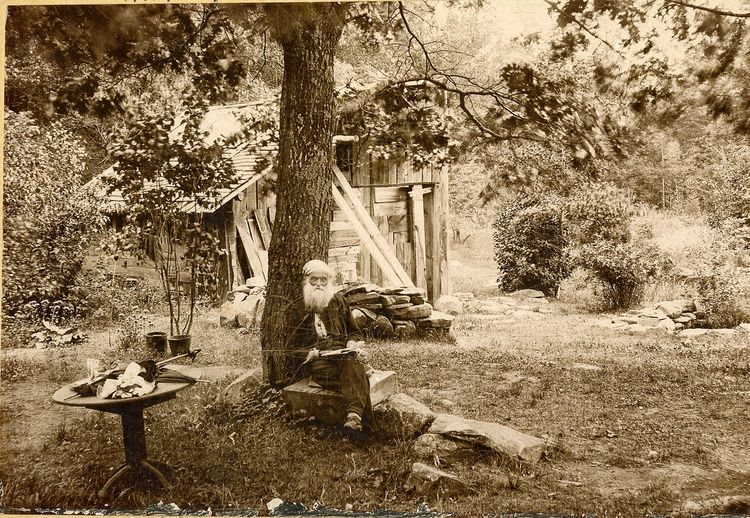The Gentle Art of Savageness, Changefulness, Rigidity, Naturalism, Grotesqueness, and Redundancy: Jo and Danny Talk J.M. Whistler

DANNY: Jo! Yesterday I had the pleasure of introducing to you James McNeill Whistler (yes, that Whistler)’s remarkable book The Gentle Art of Making Enemies when I quoted one of his letters to you as you considered writing a slightly sharpish email. Specifically this letter, which was very brief and sent to Mortimer Menpes, a fellow-painter and incidentally the godfather to Oscar Wilde’s son Vyvyan (even more incidentally, Menpes was Vyvyan’s also-ran godfather, because Wilde asked John Ruskin first):
“You will blow your brains out – of course
Piggot has shown you what to do, under the circumstances, and you know your way to Spain
Goodbye!
[butterfly signature]”
I think about this note often, ever since my wife Grace showed it to me a few years ago; I think it perfectly captures the twin passions of the Victorian letter-writers, viciousness and whimsy. It may even be the greatest note ever written.
The Gentle Art of Making Enemies includes a partial transcript of Whistler’s libel case against Ruskin, who did not like Nocturne in Black and Gold – The Falling Rocket and called it “a pot of paint,” as well as a number of Whistler’s various “letters to the editor” at a bunch of different newspapers on the subject of a hundred other grievances. I love The Gentle Art; I believe you read it yesterday, and I took the same opportunity to revisit De Quincey’s Murder, Considered As One of The Fine Arts, which feels to me like a spiritual echo, or I guess prefigurement, to The Gentle Art, since it came out quite a few decades earlier. It sometimes feels to me like the Victorian preoccupation with pettiness and vindictiveness is a product of its interest in the Middle Ages? Or maybe it’s more precisely located halfway between the Victorian reassessment of the Middle Ages and the Industrial Revolution; they meet in the middle in the subject of miniaturization.
All this to say: What did you think of the book?
JO: Good morning. I was keen to read the book and excited to hear of its existence, because the Whistler / Ruskin court case has bothered me a lot for a long time. Like, somebody told me about it, maybe a teacher? at school and ever since I’ve been trying to understand exactly what Ruskin’s problem was. It’s a good painting. It’s just obvious. So, although I’d read stuff about the case, it was actually great to look directly into Whistler’s brain instead. And what is there is deeply, deeply unserious. Whistler was painting good paintings and taking the piss and doing absolutely nothing in between.
This makes the conflict with Ruskin make so much more sense, because Ruskin didn’t have much of a sense of humor and had such a deep commitment to the subjects of which he thought he was marquis that Whistler’s attitude must have burned.
DANNY: They seemed designed in a lab to enrage one another, in some ways! Like they’re both oysters in their own heads, and both piles of sand in one another’s, generating pearls right and left in a fury.
JO: He didn’t just call it a pot of paint, he said it was a pot of paint flung in the face of the public by a coxcomb imbued by Cockney impudence.
DANNY: Which I think we can safely take as a pretty blatant allusion to public masturbation!
JO: Oh that makes sense actually considering the painting.
So, I have more thoughts about Whistler and the fact that he was so annoying that he is slightly making me come around to a) loving Ruskin personally, b) accepting deeper into my heart that Ruskin was at the center of the world whose ruins I have inhabited, and c) realizing that “acting like John Ruskin” is kind of my problem and also my fear. Let me find a bit of Whistler driving me insane.
DANNY: Incredibly, I just asked my (Victorianist) wife what she thought of the public masturbation implication, and she said, “Not only do I agree, I argued as much in my first book: QUAINT, EXQUISITE: VICTORIAN AESTHETICS AND THE IDEA OF JAPAN.” Which of course is where I got the idea from, then eventually forgot I learned it from her. This is very much like me, I often mention things to people thinking I told them the relevant story years ago when in fact I never mentioned it, or attribute one of their own anecdotes or arguments to myself; if I love you, I eventually assimilate you into my own head, and believe you know everything I know, and vice versa. Which is a very complimentary way of describing “I just told my wife her own unique scholarly argument about Whistler as if I’d thought of it.”
JO: Oops! Sorry Gracie! It’s called influence.
DANNY: Hah! And of course I think the book interests me because it’s such a beautiful insight into the British relationship to libel, which often baffles me. Also I love the phrase “Ruskin was at the center of the world whose ruins I have inhabited.”
JO: Well, that’s actually specific now that I think about it. A while ago I rang a beloved friend of mine who specializes in the Romantics (which, blurgh) but has the best brain, and he was telling me that the older he gets, the more he has to accept that there is a special thing about Ruskin. It’s sort of behind the moralizing, or at least that’s the only way I’ve gotten at it in the earlier things. He got a lot better at writing as he got older and less stable, too.
So yeah, I think the goodness of Ruskin was in his total commitment and his delusional belief in a true moral aesthetic center to all things in a way that ultimately makes him a more stylish thinker than Whistler but not as good of a stylist. Like, the table of contents to his book about the Gothic makes me want to scream into a pillow:
Savageness
Changefulness
Rigidity
Naturalism
Grotesqueness
Redundancy
Compare the stately absurdity of a poem like that to one of Whistler’s cunty little asides:
Atlas, mon bon, méfiez-vous de vos gens! Your art gentleman says that Mr. Whistler exhibits twelve etchings, The World, Dec. 29, 1880. "slight in execution and unimportant in size."
This kind of peppering of speech with French is annoying. Whistler’s etchings take up way too much of the book considering they were rubbish. Referring to a review of your own work is even more annoying. Addressing a critic by name in an ongoing spat that both of you completely expect to be published is more annoying still.
And yet—to call that critic “your art gentleman” is very good. Another one I found to be undeniable was:
No; shrive your naughty soul, and give up Velasquez, and pass your last days properly in the Home Office.
Ten O’Clock is pretty fine too in spots.
DANNY: Here I should confess that I find it very difficult to think about Ruskin at all; I get trapped in the pedophilic shadow of the entire 19th century, and cannot escape the gravitational pull of the “round sylphs” letter to Kate Greenaway. I can’t get un-stuck from it! So a large part, perhaps the better part, of my affection for The Gentle Art (which has absolutely nothing to do with Ruskin’s feelings about girls and girlhood) is just misattributed aggression: The enemy of my enemy is my friend, even if we’re both enemies with him for different reasons.
JO: That was originally my position and then Whistler converted me against it by continually referring to ‘Arry Quilter, which I think is a whole Victorian satirical thing but again—
DANNY: It’s Clare Quilty, or nearly!
JO: Lol.
DANNY: Don’t you think? I feel like Lolita pulls in equal measure from the specter of ‘Arry Quilter and Quilp from The Old Curiosity Shop. Hang on let me ask my wife if this is just something she has told me before..
JO: See, this is how Victorian culture ends up in like a maelstrom of detail that encourages me to return to the Middle Ages every day. I can’t keep track of this. And I’m sure it’s all important, which just pisses me off even more.
DANNY: It IS a maelstrom of detail! I think this is the closest I have ever come to understanding “This storm is what we call progress,” thank you for that.
JO: Everything means everything and none of it means anything but my hat flew off.
The key to loving Ruskin, Danny, is to feel for him the genuine pity that can only come from choosing to consider yourself exempt from time itself 💅
I liked this bit from Whistler’s “Ten O’Clock” which is centrally about how looking at the things right in front of you as they appear to you is a perfectly reasonable way to paint and that imagining you are Plato is not:
That, could we but change our habits and climate—were we willing to wander in groves—could we be roasted out of broadcloth—were we to do without haste, and journey without speed, we should again require the spoon of Queen Anne, and pick at our peas with the fork of two prongs. And so, for the flock, little hamlets grow near Hammersmith, and the steam horse is scorned.
And then:
Listen! There never was an artistic period.
There never was an Art-loving nation.
He’s right. Which kind of brings us back around to last week’s missed connection about BBC culture and its connection to terfs. It’s quite simple, I think, just divide and rule. You get this bit of society, and you get this bit, and daddy will look after all of you, and if a mean person comes along and tries to take away your special bit then you are licensed to fight tooth and nail to defend your fiefdom. And feminists of a certain era had jobs in the media way earlier in the UK than in the US—your Germaine Greers and Julie Bindels were on television when I was a kid. Nobody gives anything up willingly—especially self regard and favor from the man in charge.
Like the terfs who inherited that spot in the media, Ruskin was not aware of the effect of this babyish dynamic on his mind, or felt oppressed by and ambivalent about his relationship to power, which was why it was so easy to wind him up.
DANNY: It’s the sort of problem that bedevils a nation of firstborn sons; America has the problems associated with a nation of second and third sons. That is to say British intellectuals are always defending their inheritance while Americans are always stealing everybody else’s.
I do love the original subtitle, which I think in many ways summed up a sort of Toast-era Mallory Ortberg spirit: “As pleasingly exemplified in many instances, wherein the serious ones of this earth, carefully exasperated, have been prettily spurred on to unseemliness and indiscretion, while overcome by an undue sense of right.”
It’s also just a longer way of saying “u mad?” of course.
JO: The answer being yes, absolutely furious.
DANNY: Well, I think it’s about time we wrapped this up – You know the way to Spain, of course…?
JO:




Comments ()